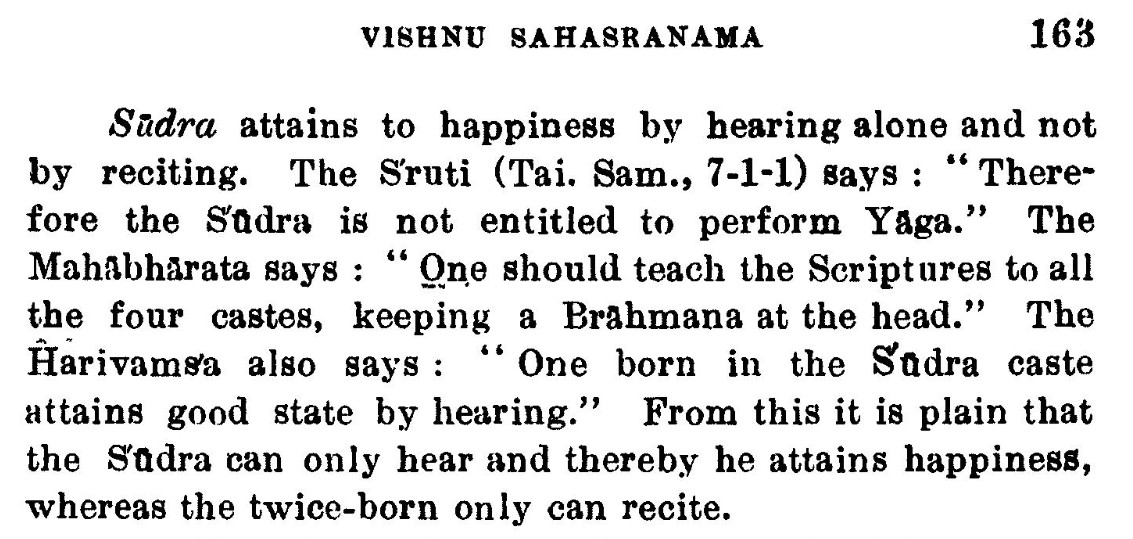Sudras are eligible for reciting Vishnu Sahastranaama without any doubt as they are namas. But Sudras should not do Yagna using the names as mantras.
Let us analyze it in more detail.
The Vishnu Sahastranaam was told by Bhishma in response to the following question by Yudhishthira.
किमेकं दैवतं लोके किं वाप्येकं परायणम् ।
स्तुवन्तः कं कमर्चन्तः प्राप्नुयुर्मानवाः शुभम् ॥ ८॥
को धर्मः सर्वधर्माणां भवतः परमो मतः । किं जपन्मुच्यते
जन्तुर्जन्मसंसारबन्धनात् ॥ ९॥
"Yudhishthira said, "Who may be said to be the one god in the world?
Who may be said to be the one object which is our sole refuge? Who is
he by worshipping whom or hymning whose praises human being would
get what is beneficial? What religion is that which, according to thy
judgment, is the foremost of all religions? What are those
Mantras by reciting which a living creature becomes freed from the bonds of birth and life?'
We can observe that Yudhistrira is asking for all varnas in order to praise, worship, and for Japa. Since those are 1000 namas, anyone can do nama Japa. If someone wants to do it as mantra Japa, then it is sure that Sudras are of course not eligible without initiation 1 2.
Let us observe how Bhishma views it
जगत्प्रभुं देवदेवमनन्तं पुरुषोत्तमम् ।
स्तुवन् नामसहस्रेण पुरुषः सततोत्थितः ॥ १०॥
तमेव चार्चयन्नित्यं भक्त्या पुरुषमव्ययम् ।
ध्यायन् स्तुवन् नमस्यंश्च यजमानस्तमेव च ॥ ११॥
अनादिनिधनं विष्णुं सर्वलोकमहेश्वरम् । लोकाध्यक्षं स्तुवन्नित्यं
सर्वदुःखातिगो भवेत् ॥ १२॥
One should always, with alacrity and throwing away all languor, hymn
the praises of that Lord of the universe, that god of gods (viz.,
Vasudeva), who is Infinite and the foremost of all Beings, by
uttering His thousand names. By always worshipping with reverence and devotion that immutable Being, by meditating on him,
by hymning His praises and bowing the head unto Him, and by
performing sacrifices unto Him, indeed by always praising Vishnu,
who is without beginning and without end or destruction, who is the
Supreme Lord of all the worlds, and who is the Master and Controller
of the universe, one can succeed in transcending all sorrow. One
should always, with alacrity and throwing away all languor, hymn the
praises of that Lord of the universe, that god of gods (viz.,
Vasudeva),
एष मे सर्वधर्माणां धर्मोऽधिकतमो मतः । यद्भक्त्या पुण्डरीकाक्षं
स्तवैरर्चेन्नरः सदा ॥ १४॥
Even this, in my judgment, is the foremost religion of all religions,
viz., one should always worship and hymn the praises of the
lotus-eyed Vasudeva with devotion.
तस्य लोकप्रधानस्य जगन्नाथस्य भूपते ।
विष्णोर्नामसहस्रं मे शृणु पापभयापहम् ॥ १८॥
यानि नामानि गौणानि विख्यातानि महात्मनः । ऋषिभिः परिगीतानि तानि
वक्ष्यामि भूतये ॥ १९॥
Hear, O king, the thousand names, possessed of great efficacy in
destroying sins, of that foremost one in all the worlds that Master of
the universe, viz., Vishnu. All those names derived from His
attributes, secret and well-known, of the high-souled Vasudeva which
were sung by Rishis, I shall recite to thee for the good of all.
Bhishma used stuthi, stava, nama only and not a mantra or some other thing that needs initiation.
Now, let us see what did Adi Shankaracharya say about Sudra's's eligibility and in which aspect. For this, we need to check phalasruthi and its commentary part of the sahastranaamas.
य इदं शृणुयान्नित्यं यश्चापि परिकीर्तयेत् । नाशुभं
प्राप्नुयात्किञ्चित्सोऽमुत्रेह च मानवः ॥ २॥
वेदान्तगो ब्राह्मणः स्यात्क्षत्रियो विजयी भवेत् । वैश्यो धनसमृद्धः
स्याच्छूद्रः सुखमवाप्नुयात् ॥ ३॥
That man who hears the names every day or who recites them every
day, never meets with any evil either here or hereafter. If a
Brahmana does this he succeeds in mastering the Vedanta; if a
Kshatriya does it, he becomes always successful in battle. A Vaisya,
by doing it, becomes possessed of affluence, while a Sudra earns
great happiness.
Thus it is evident that anyone can praise using the 1000 namas of Vishnu. Adi Shankara is telling that Sudra cannot do the yagna using these namas (as mantras) since Sudras are not eligible for doing yagnas. In general, Yagna needs mantras and hence Sudra is not eligible in doing so. But Adi Shankara didn't prevent Sudras from doing nama japa or stuthi or reading stava. And a special privilege to Sudra is that she gets all the benefits without recitation and just by listening, which does not prevent Sudra from doing nama japa or nama stuthi etc.,
Since I am not able to understand the language perfectly, I am providing the link of Adi Shankara commentary about Sudras in Sanskrit and Hindi which I understand, does not stop Sudras from praising, worshipping as sthuthi, stavva and nama japa, etc., but restricts sudra to not perform yagna. And as I understand, Shankaracharya says that it is enough for Sudra to listen in order to get happiness and results but not necessarily by explicit Japa Yagna like other varnas.
You can see the difference between yagna and parayana of sahaastraama.
Yagna: 1, 2
Parayana : 1, 2
